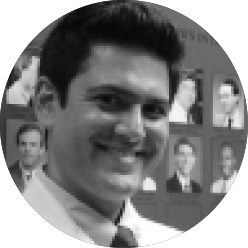supported by


Ryan Vasan, MD
Ryan Vasan, MD, is a Cornea Fellow at Wake Forest Baptist Hospital and the North Carolina Eye Bank, both in Winston-Salem, North Carolina. Dr. Vasan received his medical degree from Wake Forest University School of Medicine and was elected to the Alpha Omega Alpha honor society. He recently completed his residency at Weill Cornell Medical College in New York City prior to beginning his fellowship.
Ryan, thank you for accepting our invitation to be our “One to Watch.” Please share with us your background.
I grew up the son of two physicians in rural southern Arkansas and knew from an early age that I wanted to be a doctor. Initially, I thought I would go into radiology or radiation oncology like my parents, but an unexpectedly great third-year rotation changed all of that.
I graduated from Duke University before attending Wake Forest University School of Medicine. I did my residency training in New York at Weill Cornell Medical College. I came back to my alma mater at Wake Forest for my fellowship, and had no idea I would miss New York as much as I have.
What drew you to ophthalmology and your field of interest?
I loved photography growing up, as my father was an amateur photographer with a darkroom in our house. I was active in photojournalism in high school and college. As a medical student, I was lucky enough to get a rotation in ophthalmology and was instantly drawn to the field, as my attendings used the metaphor of the eye as a camera to describe pathology to their patients.
Describe your current position, both clinically and academically.
I am currently in a cornea fellowship jointly sponsored by the North Carolina Eye Bank and Wake Forest Baptist Hospital. In my fellowship, I get to train with Drs. Keith Walter and Matt Giegengack. We’re lucky to receive a lot of pathology because our hospital draws patients from a very wide area.
Additionally, I have the opportunity to spend time at the North Carolina Eye Bank, which is the second-largest eye bank in the nation. This unique relationship allows me to learn all aspects of tissue procurement to better understand all the steps that happen before the graft shows up in the operating room and also what role ophthalmologists have in advising eye banks as medical directors.
What are some new technological advances that you have found particularly exciting in their application? Which advances in the pipeline are you most enthusiastic or curious about?
The EndoSerter (Ocular Systems, Inc.) is something that I am very excited about. At Wake Forest, we use it for all Descemet stripping automated endothelial keratoplasty (DSAEK) procedures, and it makes graft insertion precise and almost effortless. I am looking forward to laser-assisted cataract surgery this year and, down the road, using toric multifocal lenses and presbyopia-correcting corneal implants.
Who were/are your mentors?
Both Drs. Walter and Giegengack influenced me toward cornea at an early point. During medical school, I worked with them and am now training under them for this year. Between medical school and my fellowship, my mentors in residency at Weill Cornell Medical Center were Drs. Christopher Starr, Benjamin Levine, Gary Lelli, Ed Lai, and Nate Radcliffe. I was lucky to find mentors both within cornea and outside of the specialty as well as ones who are at different stages of their careers.
To what do you attribute your success?
I think everyone in our field works hard and loves what they do; otherwise, we wouldn’t put in the hours. To me, everything is still very new and exciting, and that makes me want to expand my knowledge and apply that to patients. Being excited about what you’re doing enables you to be in the right place at the right time. There is so much on the horizon in terms of new corneal implants and surgical developments, that it’s easy to stay interested.
On what does some of your research focus?
Currently, as well as before residency, my research focused primarily on outcomes after small-incision DSAEK. During residency, I worked on a few projects involving corneal biomechanics as predictors of corneal ectasia.
What publication are you most proud of or feel has been the most important to your career?
Although it was back in medical school, I’m proud of the work I did with Dr. Walter on small-incision DSAEK. The technique used then has been changed significantly, and I think looking at our outcomes partially led to the evolution of the procedure.
What is a typical day in the life of Ryan Vasan? What keeps you busy, fulfilled, and passionate?
As of now, I divide the majority of my time between clinics, the operating room, and the eye bank during the week, and on the weekends, I travel up to New York frequently to see my fiancée. When I’m there, I try to see as much stand-up comedy as possible. It’s been a passion of mine for as long as I can remember, and in residency, I would see as many shows as I could fit into my schedule. Although there aren’t many live shows in this part of the country, I get my fix during trips to New York and by listening to comedy podcasts when at home.
What is your 10-year game plan, personally and professionally, if you wish to share.
I’m still thinking about next year!
Any advice for younger ophthalmologists? What would you tell someone just now choosing his or her career path after finishing his or her residency or fellowship?
For those in residency, I would say, learn to be proficient in all aspects of ophthalmology. Even if you aren’t interested in a certain field, you never know when a technique learned in one setting can be useful in another. By looking at what other people are doing, even in other specialties, we can often innovate by adapting a “borrowed” skill. For those in fellowship, I’ll give you some words of wisdom next July!


